- Clone
- 2E2/IDO1 (See other available formats)
- Regulatory Status
- RUO
- Other Names
- Indolamine 2,3-dioxygenase, Indole 2,3-dioxygenase, Indoleamine-pyrrole 2,3-dioxygenase
- Isotype
- Mouse IgG1, κ
- Ave. Rating
- Submit a Review
- Product Citations
- publications
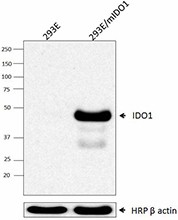
-
Total cell lysates (15 µg protein) from 293E untransfected or transfected with mouse IDO1 were resolved by 4-12% Bis-tris gel electrophoresis, transferred to nitrocellulose, and probed with purified anti-IDO1 antibody (clone 2E2/IDO1). Proteins were visualized using a goat anti-mouse IgG secondary antibody conjugated to HRP and chemiluminescence detection. Direct-Blot™ HRP anti-β-actin Antibody was used as a loading control.
| Cat # | Size | Price | Quantity Check Availability | Save | ||
|---|---|---|---|---|---|---|
| 654001 | 25 µg | $136 | ||||
| 654002 | 100 µg | $276 | ||||
IDO1 is also known as Indolamine 2,3-dioxygenase, Indole 2,3-dioxygenase, and Indoleamine-pyrrole 2,3-dioxygenase. IDO is a ubiquitously expressed cytoplasmic protein with a predicted molecular weight of approximately 45 kD. Indoleamine 2,3-dioxygenase (IDO) is one the best known IFN-γ inducible genes. The product of IDO gene catalyzes the degradation of the essential amino acid L-tryptophan to N-formylkynurenine. IDO has been implicated to protect against intracellular and extracellular pathogens. It also has been shown to maintain the special immune suppressive status of immune-privileged sites such as the brain, eyes, kidney, and placenta.
Product DetailsProduct Details
- Verified Reactivity
- Mouse
- Antibody Type
- Monoclonal
- Host Species
- Mouse
- Immunogen
- Recombinant mouse IDO1.
- Formulation
- This antibody is provided in phosphate-buffered solution, pH 7.2, containing 0.09% sodium azide.
- Preparation
- Protein G affinity purified.
- Concentration
- 0.5 mg/ml
- Storage & Handling
- Upon receipt, store undiluted between 2°C and 8°C.
- Application
-
WB - Quality tested
- Recommended Usage
-
Each lot of this antibody is quality control tested by Western blotting. For Western blotting, the suggested use of this reagent is 0.5 - 1.0 µg per ml. It is recommended that the reagent be titrated for optimal performance for each application.
- Application Notes
-
Clone 2E2/IDO1 reacts with mouse IDO1. It does not appear to react with mouse IDO2.
Clone 2E2/IDO1 is the same clone as anti-IDO1 clone 2E2.6. - Product Citations
-
- RRID
-
AB_2561779 (BioLegend Cat. No. 654001)
AB_2561780 (BioLegend Cat. No. 654002)
Antigen Details
- Structure
- 403 amino acids with a predicted molecular weight of 45 kD.
- Distribution
-
Cytoplasm
- Function
- Indoleamine 2,3-dioxygenase (IDO) is an IFN-γ inducible gene. It catalyzes the degradation of the essential amino acid L-tryptophan to N-formylkynurenine. IDO has been implicated to protect against intracellular and extracellular pathogens.
- Interaction
- This enzyme acts on multiple tryptophan substrates including D-tryptophan, L-tryptophan, 5-hydroxy-tryptophan, tryptamine, and serotonin.
- Biology Area
- Cell Biology, Immunology
- Antigen References
-
1. Habara-Ohkubo A, et al. 1991. Gene 105:221.
2. Munn DH, et al. 2002. Science 297:1867.
3. Frumento G, et al. 2002. J. Exp. Med. 196:459.
4. Muller AJ, et al. 2005. Nature Med. 11:312.
5. Lob S, et al. 2009. Nature Rev. Cancer 9:445. - Gene ID
- 15930 View all products for this Gene ID
- UniProt
- View information about IDO1 on UniProt.org
Related Pages & Pathways
Pages
Related FAQs
Other Formats
View All IDO Reagents Request Custom Conjugation| Description | Clone | Applications |
|---|---|---|
| Purified anti-IDO1 | 2E2/IDO1 | WB |
| Alexa Fluor® 647 anti-IDO1 | 2E2/IDO1 | ICFC |
| PE anti-IDO1 | 2E2/IDO1 | ICFC |
| TotalSeq™- B0017 anti-IDO1 | 2E2/IDO1 | ICPG |
Customers Also Purchased
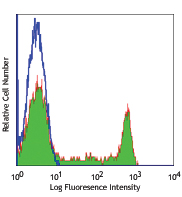
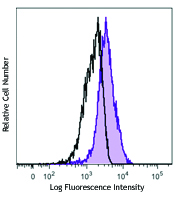
Compare Data Across All Formats
This data display is provided for general comparisons between formats.
Your actual data may vary due to variations in samples, target cells, instruments and their settings, staining conditions, and other factors.
If you need assistance with selecting the best format contact our expert technical support team.
-
Purified anti-IDO1
Total cell lysates (15 µg protein) from 293E untransfected o... -
Alexa Fluor® 647 anti-IDO1
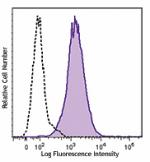
Mouse IDO1 transfected 293 cells were treated overnight (top... 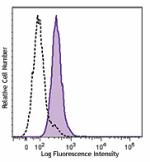
-
PE anti-IDO1

Mouse IDO1 transfected 293 cells were treated overnight (lef... -
TotalSeq™- B0017 anti-IDO1
 Login/Register
Login/Register 





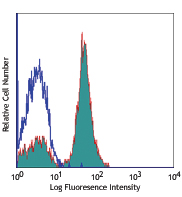

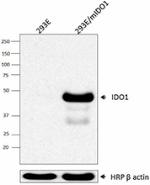



Follow Us